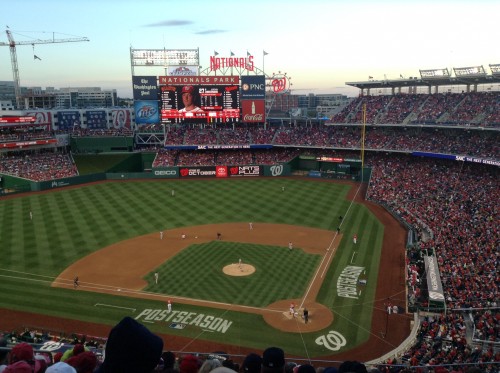
Photo Credit: Rachel Levitin
All anybody could talk about before Saturday’s Game Two of the NLDS in Washington, D.C. was the pitching match-up scheduled to start the game – San Francisco’s Tim Hudson versus Washington’s Jordan Zimmermann. Six hours and twenty-three minutes plus eighteen innings later, the longest game in recorded playoff history wrapped up and the San Francisco Giants advanced to game three with a 2-0 lead in the five-game series by beating the Nationals 2-1.
Hudson – who is notorious for his successful and often dominant outings against the Nationals – was going to be a struggle for the Nats but Washington went into the game planning to be patient with him. On the other hand, Zimmermann was fresh and just six days removed from his historical no-hitter on the final day of the 2014 regular season. The match-up made the first nine innings what they were but the final nine innings played are the reason the evening’s game turned into the longest playoff game ever played.
The Nats scored first thanks to a RBI-single hit by third baseman Anthony Rendon off Hudson that sent second baseman Asdrubal Cabrera home in the third inning. That singular run was the only run scored by either team up until a possible rally formed after Zimmermann walked San Francisco’s second baseman Joe Panik with two out in the ninth inning.
Zimmermann threw 100 pitches and 69 strikes over 8 2/3 innings while striking out six, giving up three hits plus one run, and walking the final batter he faced. The plan at that point, according to Manager Matt Williams, was to replace Zimmermann with the team’s closer to finish the game. While it was a nice thought in theory, the execution is what failed the Nats.
Right-handed reliever Drew Storen entered the game in the ninth inning and proceeded to give up a single to the Giants’ catcher Buster Posey which moved Panik to second base. Then, with two on and two out, Storen gave up a double to third baseman Pablo Sandoval to tie up the game 1-1.
Since Washington’s offense was nearly as quite as it was the day before, they failed to score in the bottom of the ninth and took the game into extra innings. Neither team got the job done and went through nearly every available body on their rosters (sans additional starting pitchers) over the course of the next nine innings played.
Things got to a boiling point early for Washington in the tenth inning when Cabrera’s temper got the best of him and he unleashed his verbal fury and frustration on the home plate umpire over a couple of calls he disagreed with. Cabrera’s actions not only got him ejected but Williams’ protection of his player moment later got him ejected as well. So, the Nationals soldiered onward after the first batter of the tenth inning without their main skipper aboard for the ride and down a starting second baseman.
For what it’s worth, the Nats’ bullpen — for the most part — got their job done. They kept Washington in the game for as long as they could but a quiet offense will not win a tie playoff game in extra innings and the game would most likely go to the team who failed to make a mistake first.
Unfortunately, the team who created the first harmful blemish in regards to Washington’s playoff campaign was a leadoff homerun hit by San Francisco’s first baseman Brandon Belt off the Nationals’ right-handed starter turned playoff reliever Tanner Roark. Roark finished pitching his one inning of work in the eighteenth by striking out two batters and inducing a ground out but Washington’s offense couldn’t salvage the night and proceeded to fall 2-1 in the eighteenth inning against San Francisco.



I enjoy what you guys are up too. This type of clever work and exposure!
Keep up the wonderful works guys I’ve included you guys to
my blogroll.